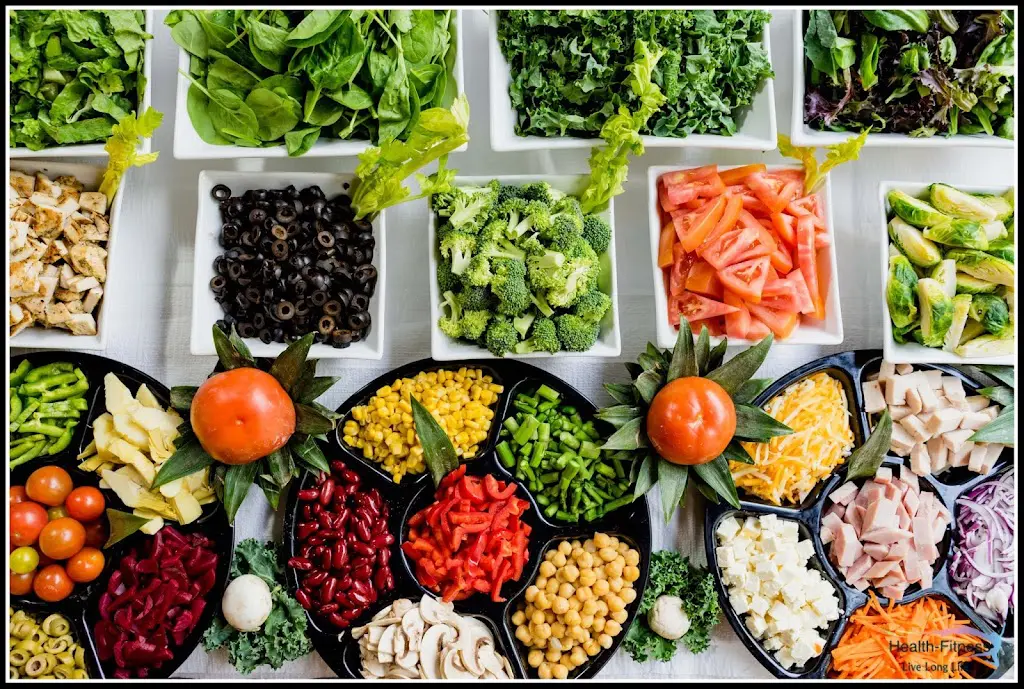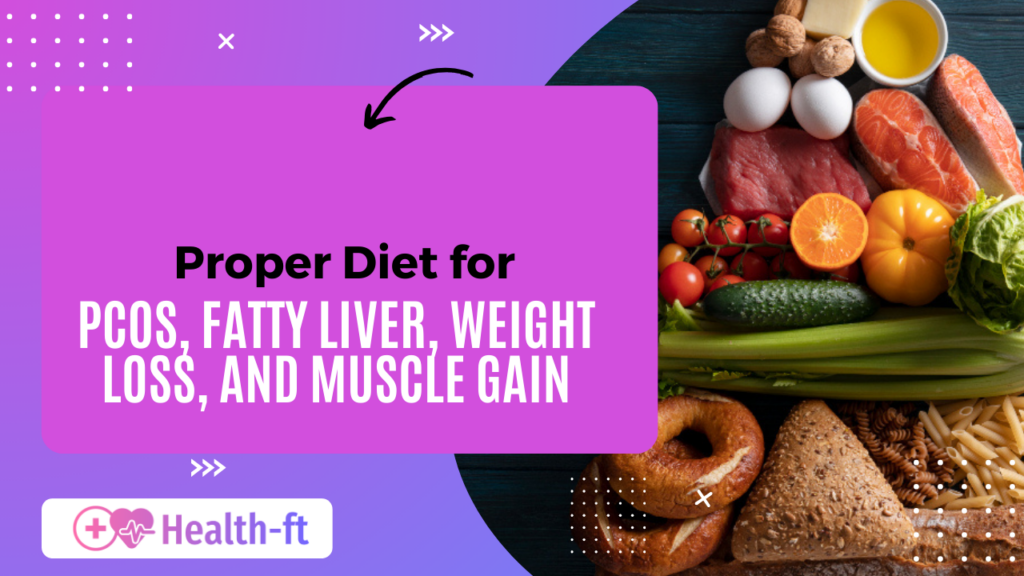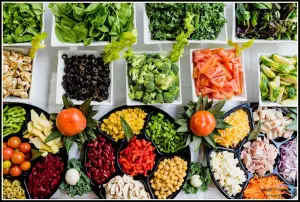Proper Diet for PCOS, Fatty Liver, Weight Loss, and Muscle Gain
A balanced diet holds great importance to control different diseases and achieve physical fitness quests. It may be PCOS, fatty liver disease, or even weight loss and muscle gain, what really matters is that PCOS requires particular dietary management. This article mainly operates as a kind of reference beginner guide to proper diets for PCOS, fatty liver, and fitness containing tips and three frequently asked questions for further comprehension.
Understanding Some of the Fundamental Facts of Human Eating Habits
A proper human diet is a diet that includes a lot of nutrient-rich whole foods while sparing very few processed and refined foods. Key principles include:
- Macronutrient Balance:
Ensure that food portions contain low glycemic Index carbohydrates, lean proteins and good fats in recommended proportions depending on your objective or health state.
- Micronutrient Sufficiency:
High food sources of vitamins and minerals include fruits, vegetables, nuts, seeds, and whole grains should be consumed in large proportions.
- Hydration:
Water should be taken regularly in the right quantity to help with digestion and detoxification, as well as improve the rest of the body processes.
- Personalization:
A person should make the necessary adjustments concerning his/her diet to meet own needs according to the lifestyle and health condition.
Proper Diet for PCOS
Polycystic Ovary Syndrome (PCOS) is an endocrine disorder that usually improves by changing carbohydrate intake and managing inflammation.
Key Dietary Recommendations:
- Low Glycemic Index (GI) Foods:
Choose foods that cause a gradual increase in blood glucose level including whole grains, lentils and most vegetables that are not starchy.
- High Fiber Foods:
Ensure that you have a lot of foods with fibre like broccoli, lentils and oat which will enhance the reception of insulin by cells.
Replenish eggs, chicken, fish and replace the first food with plant-based sources of protein to control hunger and build muscles.
- Healthy Fats:
Avoid products that promote inflammation and instead include foods rich in omega three such salmon, flax seeds and walnuts.
- Avoid Processed Foods:
Don’t consume foods that are high in sugar to avoid giving the body a sudden surge of energy thereby causing a crash.
Sample Meal Plan for PCOS:
- Breakfast: Greek yogurt topped with chia seeds, berries or any fruit of your choice with a handful of almonds will not only make your tummy happy but you eyes will be delighted too.
- Lunch: A plate of barbeque chicken accompanied by avocado, spinach, a hint of quinoa, with olive oil dressing.
- Dinner: Baked salmon with spices roasted veggies and brown rice and steamed green beans.
- Snacks: Carrot sticks with natural low-fat hummus dip, or a handful of mixed nuts.
Proper Diet for Fatty Liver
NAFLD and ALD both demand a gradual diet that does not introduce components that make the liver store fats.
Key Dietary Recommendations:
- Low-Carb, High-Protein Diet:
Eliminate highly processed carbohydrates and add lean proteins to the diet to enhance fat breakdown.
- Antioxidant-Rich Foods:
Consume green tea, green leaves, and berries to address the situation of oxidative stress.
- Healthy Fats:
Saturated fats must be consumed in moderation but look for those in healthy sources like avocados, nuts and olive oil rather than processed foods.
- Avoid Saturated Fats and Sugar:
Avoid placing added sugars to your food, sweets, and deep fried foods.
- Increase Fiber:
Take oats, whole grains, and legumes to help him/her in digestion and the liver fat should be reduced.
Sample Meal Plan for Fatty Liver:
- Breakfast: Porridge that comes from an oat and garnished with new berries and spoon of honey.
- Lunch: Grilled turkey wrap in a whole grain tortilla with lettuce, and the vegetable of the night which was broccoli.
- Dinner: Tofu stir fried with different vegetables of choice, and a serving of quinoa.
- Snacks: Slices of apple with almond butter or baked chickpeas.
Proper Diet to Lose Weight and Gain Muscle
Weight loss and muscle gain are highly correlated activities that involve having to lose fat while increasing muscle mass and to achieve this one must cut down on the overall protein calorie intake.
Key Dietary Recommendations:
- High Protein Intake:
Take foods that rich in protein such as eggs, lean meat, fish and plants with a view of supporting muscles healing and growth.
- Moderate Carb Intake:
Take more of complex carbohydrates such as sweet potatoes, whole grains and fruits in order to meet the endurance need.
- Healthy Fats:
Use sources such as nuts, seeds, and olive oil as a component of a general diet and for feelings of fullness.
- Caloric Control:
Make sure you are in a slight caloric deficit for the fat loss, but your muscle is also preserved.
- Meal Timing:
Make sure you are getting protein in the morning, during lunch, after training, and before going to bed Moreover, try to take a carb/protein formula within and after the workout.
Sample Meal Plan for Weight Loss and Muscle Gain:
- Breakfast: Omelets that are cooked from eggs beaten together with spinach and took with whole-grain toast.
- Lunch: Baked chicken with grilled skin and mixed green salad with quinoa.
- Dinner: Grilled cod fish with roasted sweet potatoes as well as green beans.
- Snacks: Whey protein shake/diet yogurt with ground nuts/nuts mixed with cottage cheese.
Some Extra Tips For Healthy Eating
- Plan and Prep Meals:
Planning for meals prevents unhealthy meals from being taken and also serves to eliminate the intake of junk food.
- Practice Portion Control:
Use small dishes and give yourself serving size guidelines so as not to take in many calories.
- Stay Active:
It is wise to follow the dietary changes with physical exercise for so that the results can be effective.
- Consult a Professional:
You should contact a dietitian or your healthcare provider to set an individual diet plan for you.
Conclusion
Unless you have conditions that prevent any specific action, a proper diet chart can be used in a modified way or to the best of your ability, to reach your goal of attaining optimum health. Just bear in mind that those who are most consistent and follow a long-term approach are the most successful.
FAQs
- Is it possible to control PCOS symptoms only with food?
Diet is therefore very important for the management of PCOS but this together with exercise and compliance to treatment if advised has even better outcomes.
- Which food products should the patients avoid if they have the condition?
Exclusion of carbohydrates in processed form, sugary products, foods fried in oil, and alcohol should be made because they precipitate liver fat synthesis.
- How many grams of protein you require to achieve your weight loss/ muscle building goals?
The recommended protein intake is between 1.6 to 2.2 grams per day per kilogram of body weight depending with your activity level and fitness regime.





